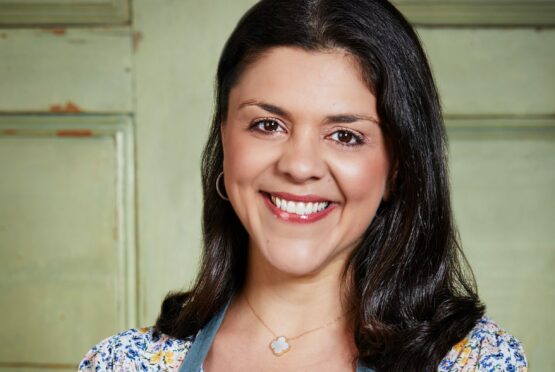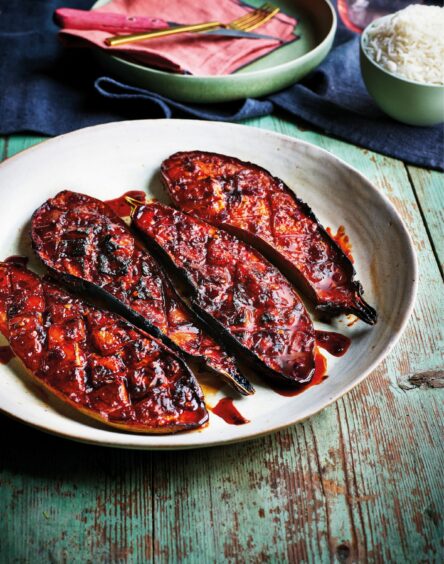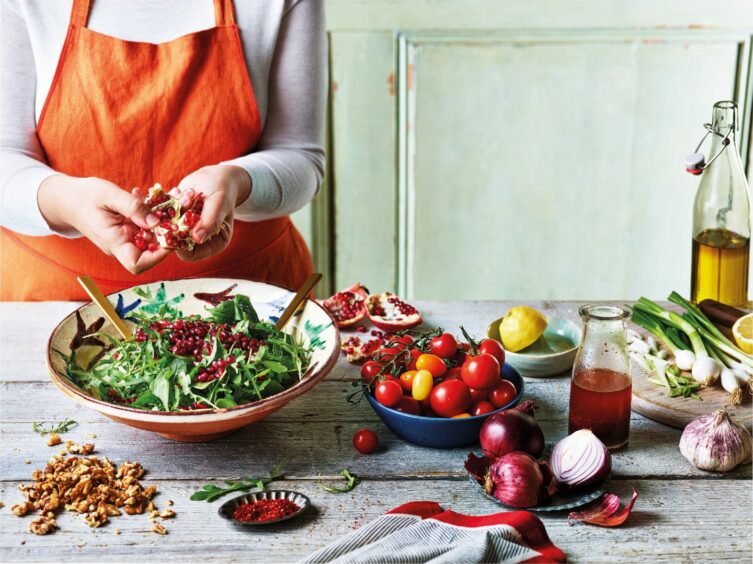
It’s absolutely no coincidence that Sabrina Ghayour’s latest cookbook is all about ease. She wrote Persiana Everyday during some major life changes: she had just become a stepmother to two young boys, and the new family were thrust into lockdown as the pandemic began.
Writing her new cookbook, she says, was a very different experience. “I was previously unattached, not married, no kids, and then I wrote it with two stepsons whilst home-schooling. It was some kind of hell, but I think that’s why it became the ‘easy’ book.”
Having spent most of her life in London (she left Tehran during the Iranian revolution in 1979), the 45-year-old chef now lives in Yorkshire with her husband Stephen, and stepsons Olly, nine (“a little Tasmanian devil”), and Connor, 13 (“a man of few words, but equally sneaky”).
While Ghayour admits it’s a “miracle” the book got written, she’s full of pride for her work – and is obviously relishing her new parental role. The everyday theme of the book might have come at a good time but it’s a culmination of her changing style over the years.
When she wrote her first book, Persiana, in 2014, she says: “Nobody knew me – I was writing a book of recipes I really wanted to put out there, whereas now I think this definitely doesn’t need that last sprinkle of whatever, or those nuts really didn’t make much of a difference, so I’ll leave them out.”
Simple, economical, flavourful are the three things Ghayour says she wants to deliver to people in her cooking. “So I’m constantly trying to strip back ingredients where I can, because it’s cheaper – and coinciding with what the heck is happening in the world, that’s not a bad thing.” Ultimately, Ghayour has a sense of humour about her food – and wants to take the pressure off everyone who tries her recipes. That’s why she focuses on flexibility, she says, as well as “giving people a sense of freedom, knowing that if they didn’t have extract of squirrel’s toenails or whatever, it’s fine. They can just use carrots.”
This is Ghayour’s sixth cookbook, and she regularly braves the steely critiques of her stepsons – but that doesn’t mean she’s fearless in the kitchen.
“Any person who tells you, ‘Oh, there’s no recipe I can’t do’ is lying,” she says. Ghayour has even had Michelin-starred chefs try her recipes and they panic – just because it’s a different discipline. “If you gave me your grandma’s apple cake recipe, of course I’m going to be bricking it, because I want to get it right. I’m not familiar with it…It isn’t my own domain.”
Ghayour remembers a time when she overcame this fear – by attacking it head on. “For the longest time, I was nervous of making English roast potatoes and roasts. This was in my early 20s, and I had a catering gig. I went to this random school, where everybody was pretty much English.
“I remember calling up one of my friends, and I was like, ‘How do I make roast potatoes?’ She was like, ‘Are you joking?’ Because they (her friends) all knew I could cook and they couldn’t, basically. I was like, ‘No, I’m not joking. They just sprung it on me last minute, they want English roast potatoes’.
“She just talked me through it. I’d never done it before, but once you realise there’s a trick – hot oil, fluff them up and all of this kind of stuff, you’re like, ‘My God, this is so easy!’ And it becomes second nature to you.”
Well, almost everything Ghayour tries becomes second nature. “Choux pastry still stresses me out,” she admits. “I refuse to make it.”
But Persian food is her specialism and she’s spent much of her career giving the cuisine a bigger platform – but there are still plenty of misconceptions about it, she says.
“It’s nothing like Middle Eastern food,” Ghayour says. “We don’t like to be labelled as Middle Eastern… They (Persians) just think of themselves as a separate tribe.
“And, in a way, I can understand that, because we were not impacted by Arab cuisine, we were not impacted or conquered by Ottoman cuisine and Empire… I can understand that sort of arrogance to protect what is truly Persian.
“We were responsible for selling many of our ingredients far and wide through the Silk Roads. The one thing I always want people to know – and they are shocked by it – is Persians don’t use spice. We harvest 92% of the world’s saffron, and that’s it.
“There might be a pinch of cumin seeds in like one rice recipe, and there endeth our use of spices. Mind blowing, isn’t it?”
Pomegranate-glazed aubergine with peanuts and spring onions

“I love aubergines and the easier the cooking method, the better the recipe,” says Sabrina Ghayour. “So here is a nice and easy way to roast them, with a deliciously sharp yet sweet glaze and a flourish of extras to finish the dish. Life needn’t be complicated and the simple things are often the best.”
You’ll need:
- 2 large aubergines, peeled and cut into round slices 2.5cm thick
- 3–4tbsp olive oil
- 2tbsp pomegranate molasses
- 3tbsp clear honey or maple syrup
- 1 spring onion, thinly sliced diagonally from root to tip
- Generous handful of salted peanuts, toasted and roughly chopped
- Maldon sea salt flakes
Method:
Preheat the oven to 220°C (200°C fan), gas mark 7. Line a large roasting tin with baking paper.
Brush both sides of the aubergine slices with the olive oil, arrange in a single layer in the lined tin and roast for 22–25 minutes until cooked through but not browned.
Mix the pomegranate molasses and honey together until evenly combined. Use a pastry brush to brush the mixture evenly over the aubergines on both sides, then sprinkle with a little salt. Roast for another five to six minutes until the glaze is thick and sticky.
Scatter with the spring onion and peanuts before serving.
Persiana Everyday by Sabrina Ghayour is published by Aster, priced £26. Photography by Kris Kirkham. Available now

Enjoy the convenience of having The Sunday Post delivered as a digital ePaper straight to your smartphone, tablet or computer.
Subscribe for only £5.49 a month and enjoy all the benefits of the printed paper as a digital replica.
Subscribe